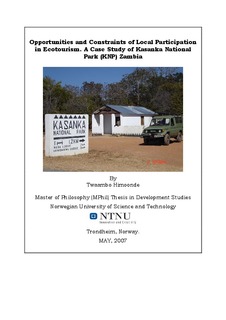| dc.contributor.author | Himoonde, Twaambo | nb_NO |
| dc.date.accessioned | 2014-12-19T14:25:30Z | |
| dc.date.available | 2014-12-19T14:25:30Z | |
| dc.date.created | 2007-06-18 | nb_NO |
| dc.date.issued | 2007 | nb_NO |
| dc.identifier | 122429 | nb_NO |
| dc.identifier.uri | http://hdl.handle.net/11250/265213 | |
| dc.description.abstract | Ecotourism may be regarded as a protected area management tool that aims to reconcile both conservation and development goals. Local participation is considered one of the main features of sustainable ecotourism development. This study was aimed at investigating how ecotourism provides a sustainable option for the local community in terms of local economic development opportunities. The study also sought to examine what local benefits accrue to the community and the level at which they participate in ecotourism. The study further identified alternative coping strategies that locals are engaged as a means of survival. Investigating the opportunities for and constraints on local participation, and how to draw benefits from biodiversity conservation in protected areas have been a primary concern of this study. This study also sought to examine the extent of stakeholder collaboration in the planning and management of ecotourism.
The study adopted a political ecology approach to understand the underlying power relations and resource-related conflicts that exist among local actors involved in biodiversity conservation. The study also applied participatory and community-conservation approaches to provide further understanding based on the shift in developmental thinking regarding protected area management from fortress conservation approaches to conservation and development approaches. This has entailed a shift from top-down planning to bottom-up planning for development. The current approaches to conservation place their focus on locals as instruments for sustainable conservation and use of resources such as wildlife. Local participation provides a means whereby local development can occur with community involvement in the conservation of natural resources. Its absence has meant that the wellbeing of the locals is therefore not supported. The lack of adequate local participation has continued to contribute to tensions and conflict among local actors in protected area management where biodiversity conservation is of concern. The study adopted a qualitative approach. The methods used included interviews, focus group discussion, direct observations and text analysis of documents.
This study identified several constraints that have limited active local participation in ecotourism such as local actor conflicts, capacity-building needs, inequitable access to benefits and use of resources, lack of land rights and others. The argument of this thesis is that while locals are encouraged to participate the means whereby this participation should occur should be well developed if the two-fold goals of conservation and development in ecotourism are to be achieved. The thesis argues for the need to increase opportunities for active local participation in protected area management. An increase in incentives, rights and local power to own, use, and control resources was identified as essential for the Kafinda community in order to participate actively in ecotourism. The Kafinda community may then also have an opportunity to realize the developmental potential that lies in the conservation of natural resources such as wildlife in the Kasanka National Park. | nb_NO |
| dc.language | eng | nb_NO |
| dc.publisher | Geografisk institutt | nb_NO |
| dc.subject | Master of Philosophy in Development Studies, specialising in Geography | en_GB |
| dc.title | Opportunities and Constraints of Local Participation in Ecotourism: A Case Study of Kasanka National Park (KNP), Zambia | nb_NO |
| dc.type | Master thesis | nb_NO |
| dc.contributor.department | Norges teknisk-naturvitenskapelige universitet, Fakultet for samfunnsvitenskap og teknologiledelse, Geografisk institutt | nb_NO |
